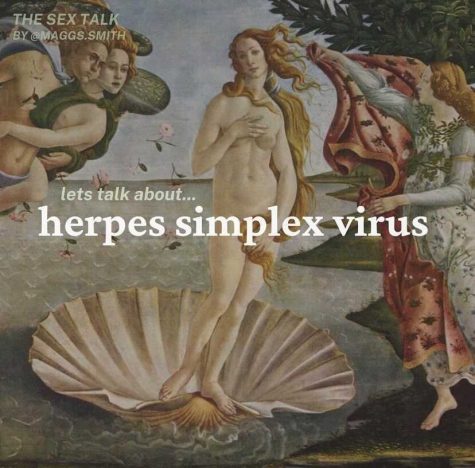One woman finds sexual liberation through social media activism

Maggie Smith opens up about her sexual trauma in a video published to her Instagram account on May 30, 2021.
October 24, 2021
Purity culture, sex, sexually transmitted illnesses and rape make people uncomfortable. Why? Vulnerability scares people. To be soft, to be seen as anything but stable is wrong in our society; pushing a correlation between transparency and weakness in this taboo feared world.
Social media has spiraled a facade that if one is open and vulnerable with anything remotely sexual, they are seen as ‘too much’ or ‘being a slut.’ The only socially acceptable way to talk about sex is by objectifying and victimizing women.
The moment an individual speaks casually about sex or their sexual trauma, they are deemed as being taboo. Sexual trauma shouldn’t be a hushed topic in today’s culture, but unfortunately it still is. People squirm and shift in their seats when confronted with the idea of people being open and safe enough to talk about sexual health and violence.
Maggie Smith, a senior studying interdisciplinary early childhood education from Louisville, has made it her mission to dismantle the crippling stigmas with STIs and sexual violence. She described the purity protecting focus her private Christian school placed on young women instead of creating a safe space for their bodies. She was taught that her life was supposed to be dedicated to combatting sinful sexual acts.
“I was taught that my body was a vessel for sin, essentially,” Smith said. “It’s like every day you have to work to deny yourself, to basically fight your sinful urges.” Being taught not to explore sexually or view yourself as a sexual being left Smith with a lot of things to unlearn about what her body means to her and society. She felt disconnected from herself after a lack of healthy sex education.
“It doesn’t really set a good foundation to experience healthy sexual experiences or even any intimacy with anyone platonic. Otherwise if you don’t feel grounded, it’s just like you’re free falling.”
Smith opened up about being raped her senior year of high school. The severity of that experience and the misleading information from her absence of sex education caused her to deny the assault to herself until this year.
“When I was raped, which I didn’t even consciously admit to myself until literally a few months ago, your subconscious basically short circuits,” Smith explained. “How am I supposed to heal from something that is not even comprehensible?”
It is known that hypersexual behavior can be triggered from traumatic events. Smith struggled with navigating her trauma, repressing her mental health that inevitably caused hypersexual tendencies after being raped.
“I ended up having a full actual sex addiction my sophomore year, which ended with me getting herpes.”
The Mayo Clinic defines Genital Herpes Simplex type 1, commonly known as oral or genital herpes, as “cold sores or fever blisters around your mouth. HSV-1 is often spread through skin-to-skin contact, though it can be spread to your genital area during oral sex.”
Smith recalls the gynecological visit, confirming HSV-1 the winter break of her sophomore year at WKU.
“I remember laying there and my head just started ringing and I didn’t hear anything else [the gynecologist] said after that. I literally thought my life was over.”
Knowing this would be a virus she would live with for the rest of her life, she began to investigate further about her prognosis.
“I didn’t know anything about herpes,” Smith stated. “All I knew about STIs from my background was that they’re horrible diseases, and they’re disgusting and basically make you unlovable and unwantable.”
Smith felt alone and uninformed about the illness she was now living with. She decided that the only way she could ease her mind and work towards reconnecting with her body was by research.
“The only solution I could come up with in my head is just to heal myself with information and with knowledge and so I just started researching.”
There is a notion, a connotation even, with sexually transmitted illnesses that they are dirty. Many people believe that having a sexually transmitted infection is something to be ashamed of. An individual is demoted as lesser or morally inferior if they contract one of these ‘dirty’ viruses.
“Nobody thinks you’re morally incompetent if you get the flu, which nobody in the world thinks you’re morally competent to get herpes,” Smith explained. “Nobody thinks you’re morally incompetent for getting mono, which is a herpes virus, but if you get genital herpes suddenly that’s the one strain of herpes virus that means you’re less than everyone else.”
In a report from the Centers for Disease Control and Prevention, they estimate that one in five people in the United States has an STI. The mononucleosis virus, also known as mono, is caused by herpes and infects around 90% of Americans before the age of 35, estimated by the Cleveland Clinic.
As she began to learn more about STIs, Smith took the famous quote by Sir Francis Bacon “knowledge is power” to heart. “Having the knowledge over those things, at least for me, is like having power over it.”
Once she felt more comfortable, she began reaching out to her close friends, sexual partners and eventually her Instagram account about her new reality with herpes. She started using social media as a forum to teach and inform others about STIs.
“I didn’t immediately start posting openly on my social media. It was small steps for me, like it was telling a close friend that I have herpes, or it was disclosing to my first sexual partner that I had it.”
Social media has helped Smith heal her trauma and challenge her perspective about herself as a sexual being. Sharing her sexual assault through an Instagram post, she began a journey to sexual liberation through vulnerability and knowledge.

Smith remarks at the shame she felt, and many more survivors feel when faced with sexual violence. She remembers a feeling of hopelessness and uncertainty of her life after her rape; a reality too many survivors are unsure of how to handle.
“We’re so bound by our shame that we don’t even help ourselves out of it.” By using Instagram as a platform to share her story and research backed information, Smith’s vulnerability allowed a space for others to have important and meaningful conversations about sex and sexual violence.
She saw how all the things we think of as sacred, taboo or just unspeakable are entwined together in our world.
“It all is connected – advocating for survivors, rape culture is connected to this STI stigma is connected to purity culture is connected to the patriarchal view; it’s all connected.”
Building a community through hard and honest conversations has given Smith a profound, unwavering grit. Being unrepentant about her existence and the things that have molded her into the woman she is today is her fuel for continuing to advocate on social media.
“That’s why I do the Instagram advocacy, because me being so open and loud about it publicly means that nobody can hurt me about it because I’m so proud, I’m confident about it. I don’t give a fuck.”
If you are considering online activism, Smith advises that you should be secure enough in yourself to not be torn down by the few people who won’t support everything you post or share.
“You have to be secure enough in what you believe that you won’t be hurt by insignificant people saying insignificant things to you online.”
Releasing burdening shame and guilt over actions that were not your fault to begin with is a difficult feat when society perpetuates the idea that one is lesser or broken if they have experienced violence in these contexts.
She encourages you to be vulnerable with yourself first before you take steps to start advocating in any regard. Your mental health and wellbeing always come first in the fight to break stigmas about sexual trauma and STIs.
“You have to overcome the hard thing; if you’re feeling shame, it goes for any kind of shame, but if we’re talking about sexual shame, usually that’s going to involve being vulnerable, even if it’s letting yourself be vulnerable with yourself like journaling your shame down.”
Smith feels liberated with the community she has formed through being unapologetic about her hardships as a woman affected by sexual trauma. She finally feels grounded in her body and spirit.
The purity culture she grew up in has no hold on who she is today. Her advocacy and passion for helping others begin their journeys in regaining their sense of self and bodily autonomy is inspiring.
The more we share our stories, the less power we give the people who abused us. No one should feel guilty for being the victim of assault. No one should feel guilty for having sexually transmitted illnesses.
Smith believes there is nowhere for shame to hide if we stop letting it fester in darkness.
“I think shame can’t exist like in the light of day.”
Follow and support Maggie Smith on Instagram at @maggs.smith.
Commentary writer Rose Donnelly can be reached at rose.donnelly430@ topper.wku.edu. Follow her on Twitter @RoseDonnelly_










